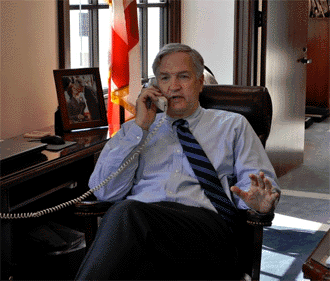By Brandon Moseley
Alabama Political Reporter
Monday, August 4, Alabama Attorney General Luther Strange (R) filed a friend of the court brief asking the U.S. Court of Appeals for the 11th Circuit to overturn the U.S. District Court’s decision that restricted the religious liberty of the Alabama based Eternal Word Television Network (EWTN) in their case Eternal Word Television Network v. U.S. Department of Health and Human Services. Alabama was the lead state in this brief, which was joined by the States of Florida and Georgia.
AG Strange said in a written statement, “I am proud to continue standing with EWTN to oppose this unconscionable mandate against its fundamental religious beliefs and liberties,” said Attorney General Strange. “I am committed to protect freedom of religion, which is our ‘first freedom’ under the U.S. Constitution. This is a basic right that the people of Alabama have enshrined in our own constitution as well. No one can be forced to offer a product that is against one’s religious beliefs or conscience.”
AG Strange has asked the Court to protect the religious liberty of Alabama citizens and religious non-profit ministries by reversing the district court’s ruling requiring EWTN and as a not-for-profit religious organization to comply with the Obamacare HHS mandate to provide contraception and abortion-inducing drug coverage in its employees’ health insurance plans. This appeal is in the wake of the landmark Hobby Lobby U.S. Supreme Court verdict which ruled that the owners of a closely held corporation could not be forced to pay for abortifacient drugs which violate their moral and religious teachings.
Alabama, joined by Florida and Georgia, is asking the appeals court to “follow the Supreme Court’s lead and binding precedent” as set forth in Burwell v. Hobby Lobby “to conclude that the contraception mandate, as enforced through the federal government’s regulations, imposes a substantial burden on EWTN.” The brief asserts that “all three states have strong constitutional and statutory protections for religious freedom,” and “have a strong interest in maintaining the very broad protections for religious liberty in the federal RFRA (Religious Freedom Restoration Act).”
In AG Strange’s statement he says that the brief argues that “religious freedom is a fundamental part of our society” and “states have an interest in creating a climate where diverse businesses and nonprofits, helmed by people of various faiths, thrive and create jobs.” The U.S. Supreme Court recently explained in the Hobby Lobby case that “citizens do not forfeit this freedom by participating in business.” The brief further argues that the district court incorrectly applied (failed to consider) whether the government had a compelling interest and whether it used the least restrictive means to further that interest. Therefore, the States argue, the lower court ruling should be reversed.
In Burwell versus Hobby Lobby the U.S. Supreme Court affirmed in a 5 to 4 ruling that forcing Hobby Lobby to provide abortions inducing drugs as part of their employee’s healthcare coverage was illegal because it violated federal statutes guaranteeing the freedom of religion. Following that ruling, EWTN was granted injunctive relief by the 11th Circuit Court of Appeals in Atlanta.
The injunction preventing the government from enforcing their controversial Department of Health and Human Services contraceptive services mandate against the Network. The appeals court released its twenty-nine page decision to allow the injunction only hours after the U.S. Supreme Court decision in the landmark Hobby Lobby case. The injunction allows EWTN to continue its court challenge of the mandate without incurring the fines of $35,000 per day that would have begun on July 1.
EWTN Chairman and Chief Executive Michael P. Warsaw said then, “This has been a very good day for religious liberty in America. The Supreme Court decision in the Hobby Lobby case was a great affirmation of the constitutional right to freedom of religious expression. While the Hobby Lobby decision did not directly resolve EWTN’s case, this afternoon’s injunction from the appellate court allows us to press forward without facing the government’s crushing fines.”
Chairman Warsaw said, “As we have said repeatedly, contraception, abortion-inducing drugs and voluntary sterilization are not health care and the government should not force EWTN to provide them as part of our employer-sponsored health plan. The Hobby Lobby decision recognizes that business owners don’t give up their religious freedom when they start a business. The fact that the Supreme Court believes that the government has an obligation to use the least restrictive means of accomplishing its goals is very helpful to the EWTN case. EWTN has raised similar arguments with regard to the government’s ‘accommodation’ scheme for faith-based organizations. We are both relieved and encouraged by the action taken by the courts today and look forward to making our case before the 11th Circuit Court of Appeals in the coming months.”
EWTN the Alabama based Global Catholic Network is a Catholic TV cable network that is available in over 230 million television households in more than 140 countries and territories. EWTN also provides direct broadcast satellite television and radio services on: AM & FM radio networks, short-wave radio, and the internet at www.ewtn.com. EWTN is also the owner of the ‘National Catholic Register’ that is part of its electronic and print news services, and publishing arm. EWTN is the largest religious media network in the world. Despite the non-profit religious evangelical nature of EWTN’s work the U.S. Government has steadfastly maintained that EWTN and similar religious affiliated employers are not exempt from the HHS mandate that all employers provide 20 different forms of contraceptives including abortion inducing drugs. Hobby Lobby only objected to four of the twenty drugs and procedures on that list.
The Obama Administration mandate requires most employers to either provide or facilitate employee insurance coverage for contraception, sterilization and some drugs that can cause early abortions. As an organization founded to uphold the Catholic faith, EWTN objected to providing or facilitating these products and practices, which violate the teaching of the Catholic Church. Hundreds of other employers have filed lawsuits across the country charging that the mandate violates federal and constitutional protections of religious freedom.
EWTN initially filed a lawsuit against the mandate in early 2012. That suit was dismissed on technical grounds in March 2013. The current lawsuit was filed in October 2013. On June 17, U.S. District Court Judge Callie V.S. Granade of Mobile, Ala. ruled against EWTN before the Burwell v. Hobby Lobby U.S. Supreme Court ruling. The appeal will be heard by the 11th Circuit Court of Appeals.
AG Strange said, “As Attorney General of Alabama, I was proud to stand shoulder to shoulder with Hobby Lobby in opposing the contraception coverage mandate which violates the most deeply held religious beliefs of business owners.”
AG Strange continued, “Alabama has a history of safeguarding our freedom of religion. In 1998, we were the first state to amend our constitution through popular referendum to forbid the state from burdening the free exercise of religion unless there was no other way to accomplish a compelling state interest. If the federal government believes free contraception is vital, then surely it can find another way to implement it than by forcing family businesses and religious broadcasters and others to violate their religious beliefs.”



















































